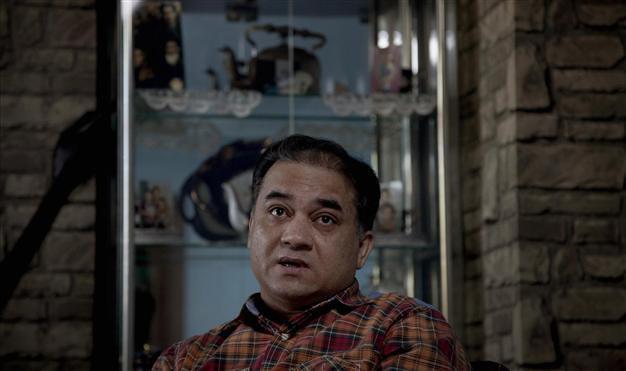China jails Uighur scholar for life for 'separatism'
BEIJING – Agence France-Presse

In this Feb. 4, 2013 photo, Ilham Tohti, an outspoken scholar of China's Turkic Uighur ethnic minority, pauses during an interview at his home in Beijing, China. AP Photo
A prominent academic from China's mostly-Muslim Uighur minority was jailed for life Sept. 23 for "separatism", with the European Union expressing outrage at the "completely unjustified" response to criticism of Beijing's policies in the restive Xinjiang region.
The EU, United States and human rights groups had all been calling for the release of Ilham Tohti, a persistent but moderate government critic who campaigned for minority rights in the vast western region.
Analysts say his unusually harsh sentence shows increased official intolerance for dissent and could stoke ethnic tensions.
The former university professor will "certainly appeal" the sentence passed in Xinjiang's capital Urumqi, his lawyer Li Fangping told AFP.
Tohti, 44, said he "did not agree" with the sentence as it was announced but was not allowed to make any further statement before officials led him away, Li said, adding that the court will "confiscate his entire property".
Tohti's wife cried loudly after the verdict was read and "was so upset she couldn't walk," he added.
Xinjiang is home to about 10 million Uighurs, and in the last year has been hit by a string of attacks on civilians and clashes which have killed at least 200 people.
China blames unrest on militant groups seeking independence for Xinjiang. Rights groups say discrimination and government repression of the Uighurs' religion and language has fuelled violence.
Police detained Tohti in January after he criticised the government's response to a suicide car attack last October in Beijing's Tiananmen Square, which the government blamed on Xinjiang separatists.
Chinese courts are controlled by the ruling Communist Party, and appeals in criminal cases are rarely successful.
The EU called the sentence "completely unjustified" and demanded the scholar's immediate and unconditional release.
"The EU deplores that the due process of law was not respected, in particular with regard to the right to a proper defence," it added in a statement.
China has cracked down on dissent under the leadership of President Xi Jinping, with dozens of academics, journalists and activists detained or jailed -- though Tohti's is the heaviest sentence given to a dissident in years.
"Ilham Tohti's sentence is extremely harsh, it's unexpected and it's shocking," said Maya Wang, a researcher for US-based group Human Rights Watch.
"For someone like Tohti, who is prominent and known outside China, to be given a life sentence for very measured criticism, that is unprecedented," she added. "It's a sign of just how much the Chinese government's intolerance of dissent has deepened."
Joseph Cheng, professor at the City University of Hong Kong, said the verdict was "a very bad signal for Han-Uighur relations", referring to China's Han majority ethnic group.
"It certainly reflects the values and the style of the Xi Jinping administration... to crack down on any dissidents and opposition," he added.
Tohti, who has three children and taught economics at a university in Beijing, said he opposed independence for Xinjiang in interviews and was seen as a moderate voice on Uighur issues, but was repeatedly subject to house arrest and prevented from leaving the country.
He went on trial last week after being denied food and kept in shackles for weeks at a time while under detention, his lawyers said.
"This tragedy proves that solving problems through peaceful means is not possible in China," said Dilxat Raxit, a spokesman for the exiled World Uyghur Congress.
Prosecutors presented videos of Tohti's university lectures and posts from his website Uighur Online as evidence that he had led a separatist group, Li said.
They also cited testimony from some of Tohti's students, around eight of whom have also been detained.
The official Xinhua news agency said the court heard that Tohti "bewitched and coerced young ethnic students to work for the website and built a criminal syndicate."
In a closing statement at his trial Tohti said he loved his country and in his opinion "it has always been in the best interests of Uighurs to remain in China", according to Li.
Tohti spoke about imprisonment in a 2009 online interview.
"In this country, with the way things are, you can go to jail for what you say -- for running a website, for just speaking the truth. That, for me, would be an honour," he said.
"To trade my humble life as a call for freedom, I'd gladly do it."
